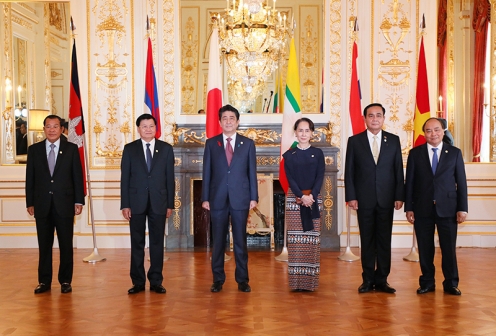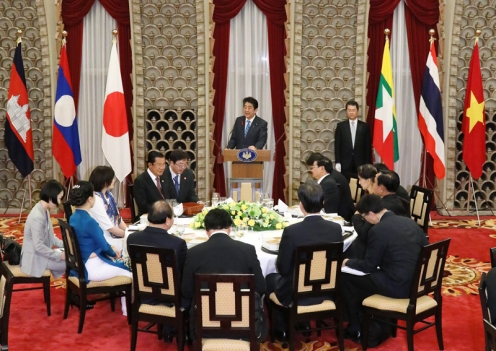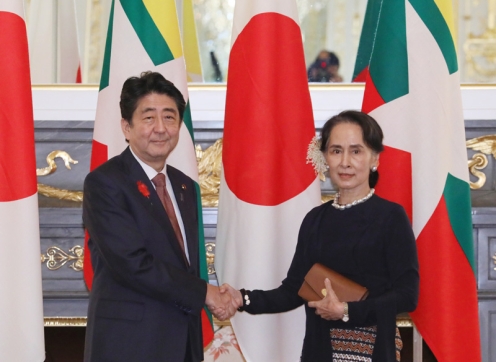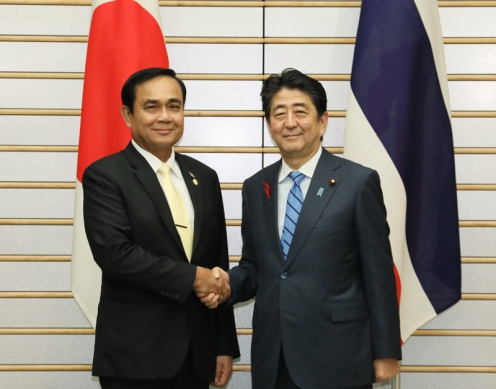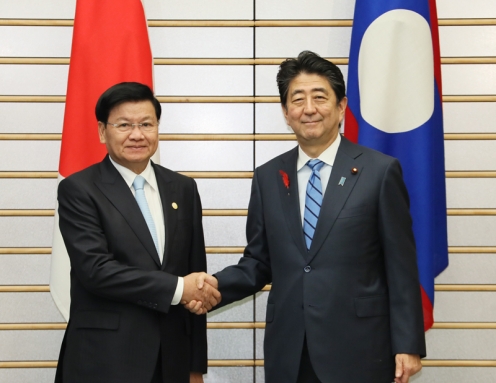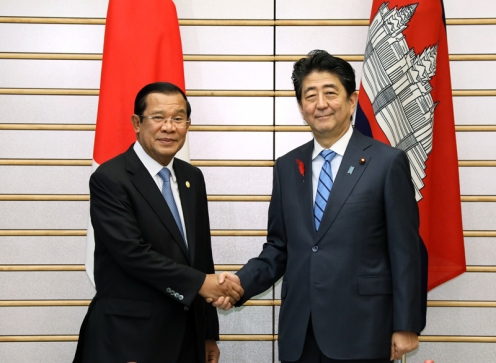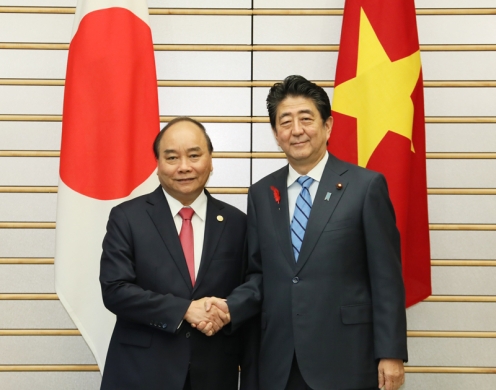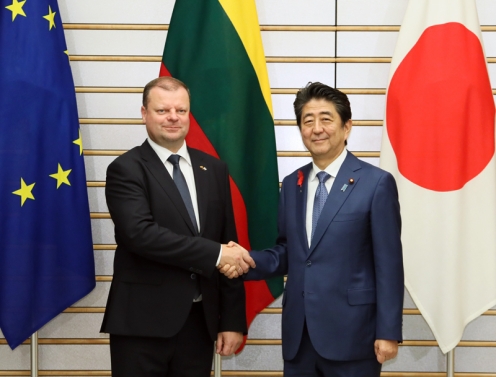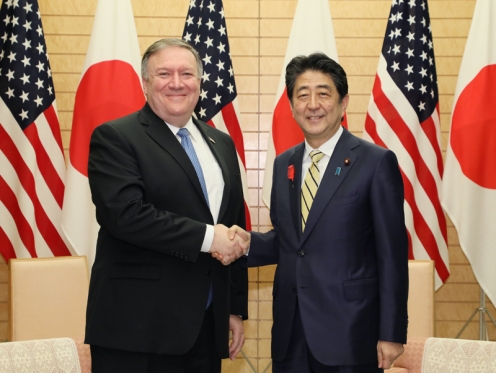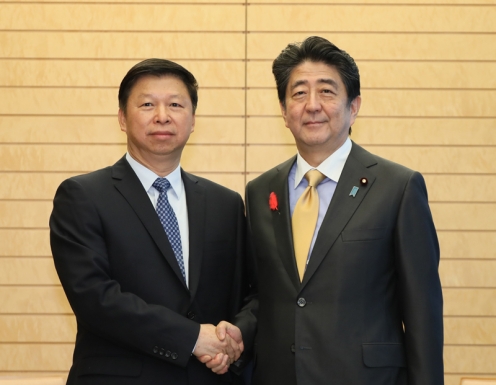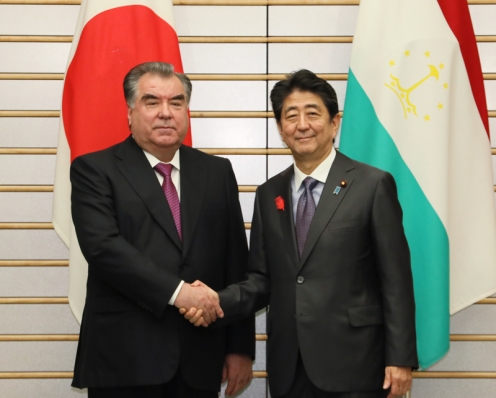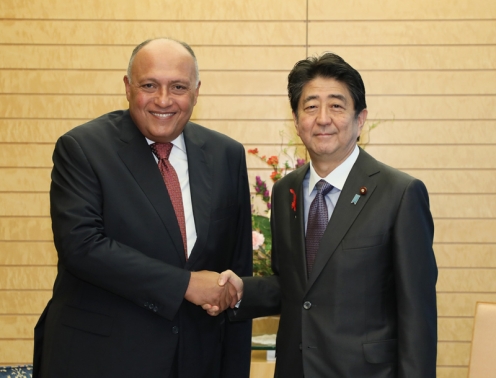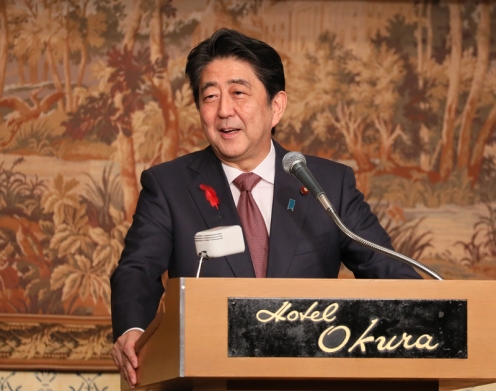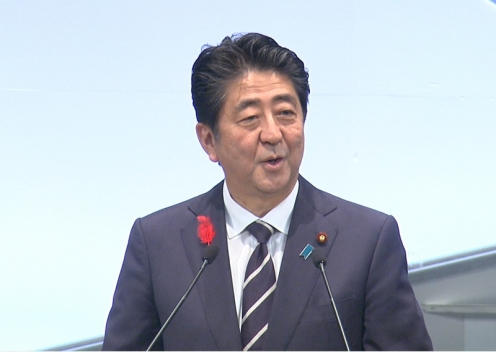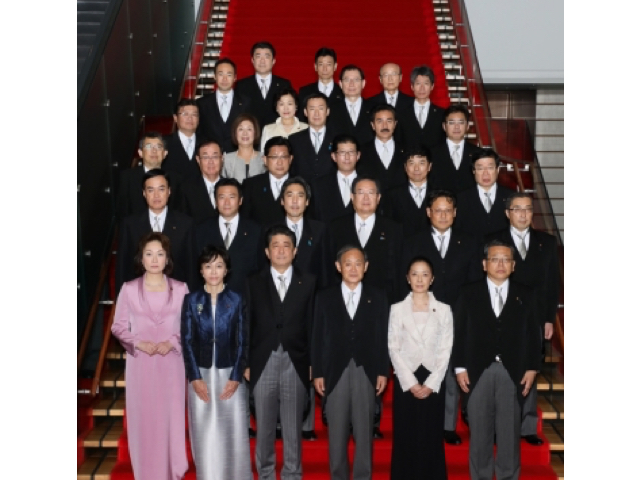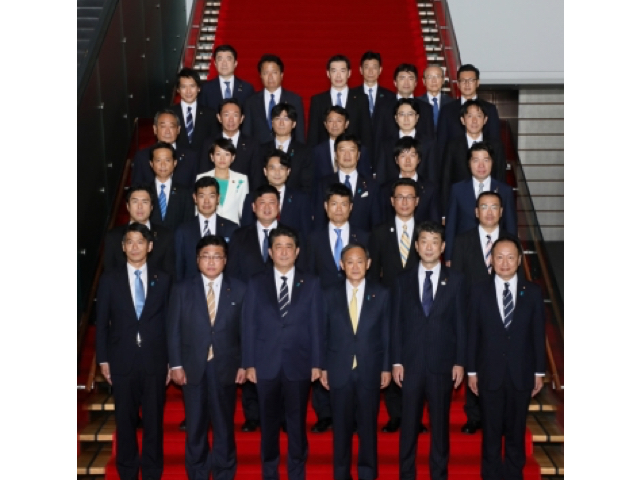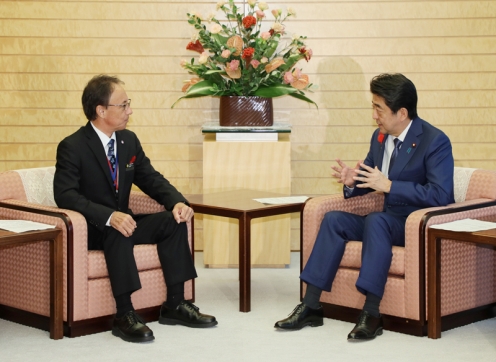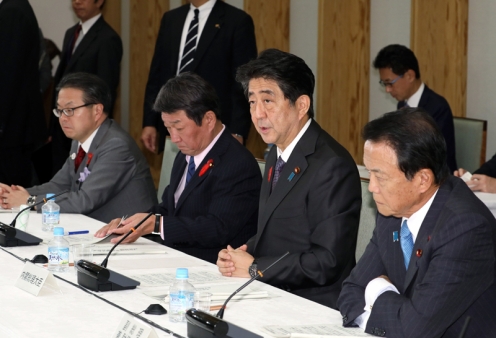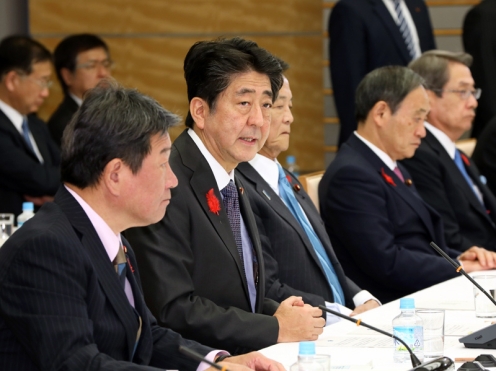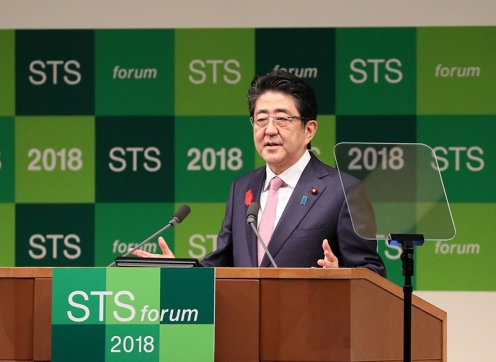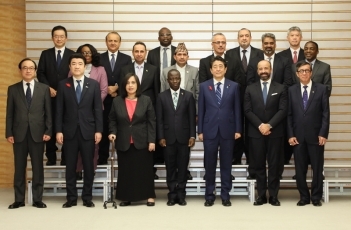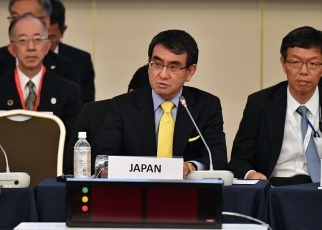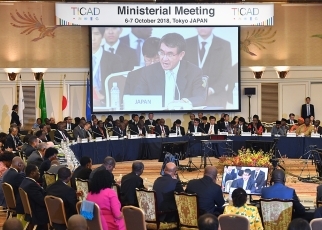Mekong-Japan Summit Meeting and Other Events
Cabinet Secretariat, Tuesday, October 9, 2018
[Provisional Translation]
On October 9, 2018, Prime Minister Shinzo Abe attended the Tenth Mekong-Japan- Summit Meeting and other events, held at the Akasaka Palace State Guest House.
Prime Minister Abe welcomed the leaders of each country, and then attended a commemorative photograph session. Following that, together with the leaders, the Prime Minister interacted with soccer players from Japan and the countries of the Mekong region who are attending the Japan-Mekong Youth Exchange Program (football). Afterwards, the Prime Minister attended the Tenth Mekong-Japan Summit Meeting, and held a joint press announcement with the leaders of each country.
In his opening address at the Summit Meeting, the Prime Minister said,
“I am honored and pleased to welcome Samdech Akka Moha Sena Padei Techo Hun Sen, Prime Minister of the Kingdom of Cambodia, H.E. Dr. Thongloun Sisoulith, Prime Minister of the Lao People’s Democratic Republic, H.E. Ms. Aung San Suu Kyi, State Counsellor of the Republic of the Union of Myanmar, H.E. Mr. Prayut Chan-o-cha, Prime Minister of the Kingdom of Thailand, and H.E. Mr. Nguyen Xuan Phuc, Prime Minister of the Socialist Republic of Viet Nam, as well as the representatives of each country, to Tokyo for the Tenth Mekong-Japan Summit Meeting.
First and foremost, on behalf of the Government of Japan and the people of Japan, I would like to express my most sincere condolences on the passing of H.E. Mr. Tran Dai Quang, President of the Socialist Republic of Viet Nam and H.E. Mr. Do Muoi, former General Secretary of the Communist Party of Viet Nam. Together with all of you, I would also like to pray for the repose of the souls.
The Mekong region is a land blessed with a wealth of human resources and a rich natural environment. This region serves as a corridor that connects East Asia with South Asia, as well as a land bridge linking the Pacific and Indian Oceans. The Mekong region possesses geographical advantages and holds the promise of a prosperous future. Japan has long supported the growth and development of the countries in the Mekong region. The framework of Mekong-Japan cooperation has reached its 10-year milestone. Taking this opportunity, I hope that we will define the relationship between Japan and the Mekong region as a strategic partnership and further advance our cooperation, so as to materialize a prosperous future together. Under the New Tokyo Strategy 2015 for Mekong-Japan Cooperation (MJC2015), Japan has provided support exceeding its pledged amount, which has catalyzed more than 2 trillion yen of investments from Japanese companies in the Mekong region over the past three years. I am very pleased that Japan has contributed to the development of the Mekong region.
Under the Japan-Mekong Connectivity Initiative adopted two years ago, the connectivity within and outside the Mekong region has been significantly strengthened. For example, travel time has been reduced by half, and toll fees are expected to increase by two or three times in some sections of the Southern Economic Corridor. There have also been remarkable results in the aspect of soft connectivity. Through support for the introduction of an electronic customs clearance system, the shortest customs clearance time has been shortened from 15 minutes to between one to three seconds. Based on these achievements, which we should be proud of, as well as the outcomes of the Mekong-Japan Ministerial Meeting and Mekong-Japan Economic Ministers Meeting held this August, I would like to set out the following three new pillars of cooperation: (1) vibrant and effective connectivity; (2) people-centered society; and (3) realization of a green Mekong. I believe that these three pillars hold the key to the further development of the Mekong region. In promoting these three pillars dynamically, we will strive to achieve the Sustainable Development Goals (SDGs) set out by the United Nations, materialize a free and open Indo-Pacific (FOIP), and promote collaboration with the Ayeyawady–Chao Phraya–Mekong Economic Cooperation Strategy (ACMECS), which the Mekong countries are advancing as a framework for economic cooperation.
Today, I hope to engage in a frank exchange of views with the leaders of the Mekong countries about the future of the Mekong region and Japan, and to formulate a guideline for future cooperation.”
Welcome Dinner Banquet Hosted by Prime Minister Abe and Mrs. Abe for the Mekong-Japan Summit Meeting
Cabinet Secretariat, Monday, October 8, 2018
[Provisional Translation]
On October 8, 2018, Prime Minister Shinzo Abe and Mrs. Abe hosted a welcome dinner banquet at the Prime Minister’s Official Residence, inviting people involved with the Tenth Mekong-Japan Summit Meeting.
The Prime Minister said in his address,
“I would like to express my heartfelt gratitude to Samdech Akka Moha Sena Padei Techo Hun Sen, Prime Minister of the Kingdom of Cambodia, H.E. Dr. Thongloun Sisoulith, Prime Minister of the Lao People’s Democratic Republic, H.E. Ms. Aung San Suu Kyi, State Counsellor of the Republic of the Union of Myanmar, H.E. General Prayut Chan-o-cha, Prime Minister of the Kingdom of Thailand, and H.E. Mr. Nguyen Xuan Phuc, Prime Minister of the Socialist Republic of Viet Nam, as well as the representatives of each country, for coming all the way to Tokyo to attend the Mekong-Japan Summit Meeting.
This is the tenth Mekong-Japan Summit Meeting to be held, and I am very pleased to celebrate this monumental milestone with all of you. As our work for tomorrow is scheduled to start at the beginning of the morning and occupy the entire time until noon, I hope that you will relax and enjoy the Japanese cuisine and sake prepared for you this evening.
Tonight, we have invited the top leaders who tirelessly work to strengthen our relationship between Japan and the Mekong region in a wide range of fields including politics, economics, and culture to the dinner banquet. Taking this opportunity, I would like to express my sincere gratitude to all of you, and I am also looking forward to your continued cooperation toward the further development of this relationship.
In closing, I would like to offer a toast to the good health of all of you, and to further prosperity of the Mekong region as well as further development of our cooperation between Japan and the Mekong region. Cheers!”
Meeting with the State Counsellor of the Republic of the Union of Myanmar and Other Events
Cabinet Secretariat, Tuesday, October 9, 2018
[Provisional Translation]
On October 9, 2018, Prime Minister Shinzo Abe held a meeting with H.E. Ms. Aung San Suu Kyi, State Counsellor of the Republic of the Union of Myanmar, at the Akasaka Palace State Guest House, as well as other events.
The Prime Minister held a meeting with State Counsellor Aung San Suu Kyi, followed by a joint press announcement. Afterwards, Prime Minister Abe hosted a banquet, and said in his address,
“I would like to welcome H.E. Ms. Aung San Suu Kyi, State Counsellor of the Republic of the Union of Myanmar, once again, on her first visit to Japan in two years.
I was told that during her stay, she visited a farming village in Fukushima Prefecture, and also attended an event related to the silk industry, as well as a seminar with Japanese companies. I hope that these visits will contribute to the economic development of Myanmar.
I am also confident that Mr. Sasakawa, Special Envoy of the Government of Japan, and Minister Kono, who are present today, will be trusted advisers whom the State Counsellor can consult with on difficult issues such as domestic peace and in the Rakhine State. We had a very meaningful talk earlier. After this, I would like you to relax and enjoy some Japanese cuisine.
In closing, I would like to offer a toast for the further development of the Japan-Myanmar relationship. Cheers.”
Japan- Thailand Summit Meeting and Other Events
Cabinet Secretariat, Monday, October 8, 2018
[Provisional Translation]
On October 8, 2018, Prime Minister Shinzo Abe held a summit meeting and other events with H.E. Mr. Prayut Chan-o-cha, Prime Minister of the Kingdom of Thailand, at the Prime Minister’s Office.
The two leaders attended a salute and guard of honor ceremony, followed by a summit meeting. Afterwards, the leaders held a joint press announcement.
Japan- Laos Summit Meeting and Other Events
Cabinet Secretariat, Monday, October 8, 2018
[Provisional Translation]
On October 8, 2018, Prime Minister Shinzo Abe held a summit meeting and other events with H.E.Dr. Thongloun Sisoulith,Prime Minister of the Lao People's Democratic Republic, at the Prime Minister’s Office.
The two leaders attended a salute and guard of honor ceremony, followed by a summit meeting. Afterwards, the leaders held a signing and exchange of documents ceremony as well as a joint press announcement.
Japan-Cambodia Summit Meeting and Other Events
Cabinet Secretariat, Monday, October 8, 2018
[Provisional Translation]
On October 8, 2018, Prime Minister Shinzo Abe held a summit meeting and other events with Samdech Akka Moha Sena Padei Techo Hun Sen, Prime Minister of the Kingdom of Cambodia, at the Prime Minister’s Office.
The two leaders attended a salute and guard of honor ceremony, followed by a summit meeting. Afterwards, the leaders held a joint press announcement.
Japan-Viet Nam Summit Meeting and Other Events
Cabinet Secretariat, Monday, October 8, 2018
[Provisional Translation]
On October 8, 2018, Prime Minister Shinzo Abe held a summit meeting and other events with H.E. Mr. Nguyen Xuan Phuc, Prime Minister of the Socialist Republic of Viet Nam, at the Prime Minister’s Office.
The two leaders attended a salute and guard of honor ceremony, followed by a summit meeting. Afterwards, the leaders held an exchange of documents ceremony and a joint press announcement.
Japan-Lithuania Summit Meeting and Other Events
Cabinet Secretariat, Friday, October 12, 2018
[Provisional Translation]
On October 12, 2018, Prime Minister Shinzo Abe held a summit meeting and other events with H.E. Mr. Saulius Skvernelis, Prime Minister of the Republic of Lithuania, at the Prime Minister’s Office.
The two leaders attended a salute and guard of honor ceremony, followed by a summit meeting. Afterwards, the leaders held a joint press announcement.
Courtesy Call from the Secretary of State of the United States
Cabinet Secretariat, Saturday, October 6, 2018
[Provisional Translation]
On October 6, 2018, Prime Minister Shinzo Abe received a courtesy call from the Honorable Mike Pompeo, Secretary of State of the United States of America, at the Prime Minister’s Office.
Courtesy Call from the Minister of the International Department of the Central Committee of the Communist Party of China
Cabinet Secretariat, Thursday, October 11, 2018
[Provisional Translation]
On October 11, 2018, Prime Minister Shinzo Abe received a courtesy call from Mr. Song Tao, Minister of the International Department of the Central Committee of the Communist Party of China, People’s Republic of China, and others at the Prime Minister's Office.
Japan-Tajikistan Summit Meeting and Other Events
Cabinet Secretariat, Friday, October 5, 2018
[Provisional Translation]
On October 5, 2018, Prime Minister Shinzo Abe held a summit meeting and other events with H.E. Mr. Emomali Rahmon, President of the Republic of Tajikistan, at the Prime Minister’s Office.
The two leaders attended a salute and guard of honor ceremony and then held a summit meeting. Afterwards, the leaders held a signing and exchange of documents ceremony and a joint press announcement.
Courtesy Call from the Minister of Foreign Affairs of Egypt and Others
Cabinet Secretariat, Friday, October 5, 2018
[Provisional Translation]
On October 5, 2018, Prime Minister Shinzo Abe received a courtesy call from H.E. Mr. Sameh Shoukry, Minister of Foreign Affairs of the Arab Republic of Egypt, and others, at the Prime Minister’s Office.
Commemorative Symposium for the 20th Anniversary of the Japan-Republic of Korea Joint Declaration
Cabinet Secretariat, Tuesday, October 9, 2018
[Provisional Translation]
On October 9, 2018, Prime Minister Shinzo Abe attended the Symposium to Commemorate the 20th Anniversary of the Japan-Republic of Korea Joint Declaration held in Tokyo.
The Prime Minister said in his address,
“Ms. Chizuko Obuchi, the spouse of the late Prime Minister Obuchi, H.E. Mr. Lee Su Hoon, Ambassador Extraordinary and Plenipotentiary of the Republic of Korea, and distinguished guests, I am deeply pleased that this symposium to commemorate the 20th anniversary of the Japan-Republic of Korea Joint Declaration on a New Japan-Republic of Korea Partnership towards the Twenty-first Century is being held today, which was signed by then-Prime Minister Obuchi and then-President Kim Dae-jung.
In 1998, then-Prime Minister Obuchi and then-President Kim Dae-jung announced that the present calls upon both countries to overcome the unfortunate history and to build a future-oriented relationship based on reconciliation as well as good-neighborly and friendly cooperation in the Japan-Republic of Korea Joint Declaration that they signed.
There exist difficult issues between Japan and the Republic of Korea due to the fact that we are neighboring countries. Looking back at the past, it is true that our paths have not necessarily been smooth. Meanwhile, it is precisely through the ceaseless efforts of many people including leaders such as then-Prime Minister Obuchi and then-President Kim Dae-jung that our two countries have succeeded in overcoming numerous obstacles to build the Japan-ROK relations of today.
Even in the aspect of people-to-people exchanges, last year we saw more than 9 million people traveling between Japan and the ROK, marking a record high. In particular, the number of visitors from the ROK to Japan has increased at a rapid pace in recent years, and the ROK is second to China in the number of visitors to Japan each year. At the same time, with the growing interest in Korean culture among the Japanese, the number of Japanese visitors to the ROK has also been on the rise recently. The number of travelers between the two countries is expected to exceed 10 million people this year. We are seeing a rising trend called the third “Hanryu” (Korean boom); for example, cheese dak galbi (a spicy Korean stir-fry) has recently become immensely trendy in Japan, and K-pop singers are gaining popularity. Such vibrant people-to-people exchanges, close economic relations, and cultural exchanges are regarded as the outcome of the personnel and cultural exchanges, which were outlined by then-Prime Minister Obuchi and then-President Kim Dae-jung in the 1998 Japan-Republic of Korea Joint Declaration, and the decision made by then-President Kim Dae-jung to open up the ROK to Japanese culture.
The resolve of the two leaders 20 years ago is a legacy that has been passed down to those of us living in the present day. Last month, I held a Japan-ROK Summit Meeting with President Moon Jae-in in New York, where we celebrated the 20th anniversary of the Japan-Republic of Korea Joint Declaration and reaffirmed our determination to foster a future-oriented relationship between Japan and the ROK.
As I touched on earlier, there exist difficult issues between Japan and the Republic of Korea due to the fact that we are neighboring countries.. To overcome these issues, I believe that it is necessary for the political leadership to make big decisions. It was precisely at the time when then-President Kim Dae-jung visited Japan for the summit meeting with then-Prime Minister Obuchi, I remember that Mr. Takamura, who will be presenting a lecture today after this, was the foreign minister at the time and I was a young and fresh member, much more fresh than today, of the Diet then. I was in the position to apply peer-pressure on the administration, so to speak, as a young member, and I often visited Mr. Takamura’s office to say various things. I have just recalled this suddenly. Anyway, I think that relations between the two countries will become future-oriented and begin to move forward only when the leaders overcome such pressures and various public opinions, and make decisions from a broad perspective of the situation. Hence, I would like to apologize once again to Mr. Takamura, then-foreign minister, for having made some discourteous remarks to him at the time. Moreover, we should also make our decisions from a broad perspective going forward.
I, as well, hope strongly that we can build a future-oriented relationship, so that the young people of Japan and the ROK can foster friendships through mutual exchanges, and work toward their dreams for the future together. As I give my thoughts to then-Prime Minister Obuchi and then-President Kim Dae-jung, I hope to work together with President Moon Jae-in for the development of the Japan-ROK relationship.
In closing, I would like to express my sincere respect to all who have contributed their best efforts to hold this symposium, including the executive committee, Keidanren, the Japan Institute of International Affairs, and the Japan-Korea Cultural Foundation. I would like to express my hopes for the further development of Japan-ROK relations, and to wish you all good health. Once again, my sincere congratulations.”
ASEAN-Japan Music Festival
Cabinet Secretariat, Thursday, October 4, 2018
[Provisional Translation]
On October 4, 2018, Prime Minister Shinzo Abe attended the ASEAN-Japan Music Festival held in Tokyo.
The Prime Minister said in his opening address,
“I am honored to observe that, in the gracious presence of Their Imperial Highnesses Prince and Princess Akishino, the second ASEAN-Japan Music Festival is being held today in such magnificent fashion, following on from the first ASEAN-Japan Music Festival five years ago.
This year is a commemorative year that marks the 45th anniversary of ASEAN-Japan Friendship and Cooperation. Top-class artists from ASEAN member states are participating in this concert that celebrates this anniversary. Tonight, you will get to enjoy music of various genres, ranging from pop, rock, rhythm and blues (R&B) to traditional folk music.
This concert has been made possible thanks to the significant contributions made by Mr. Ryotaro Sugi, Special Ambassador for Japan and ASEAN, who has engaged tirelessly in cultural exchanges all over the world, including Asia. This excellent music festival also would not have been possible without the participation of top artists from Japan and ASEAN member states. I would like to sincerely thank everyone involved in the preparations for today, including Ambassador Sugi and all of the artists participating tonight.
The artists from ASEAN member states will take this opportunity of their visit to Japan to sightsee various areas of Tokyo. At a later date, scenes from their sightseeing and today’s music festival are to be broadcast on TV and through social media in each country. I would like to ask all of you to promote the charms of Japan as much as possible, looking ahead to the 2020 Tokyo Olympic and Paralympic Games.
Music is a universal language. I look forward to the day when, as a result of this music festival, many Japanese people are humming songs from ASEAN member states and Japanese songs are played in street corners in each of the ASEAN member states.
I hope that the wonderful power of music will further deepen the ties between Japan and ASEAN, which are heart-to-heart partners. With this hope, I would like to close my remarks. This brings an end to the formalities, and I now invite you to enjoy the rest of this evening. Thank you very much.”
First Meeting of State Ministers and Commemorative Photograph Session
Cabinet Secretariat, Thursday, October 4, 2018
[Provisional Translation]
On October 4, 2018, the State Ministers for the reshuffled Fourth Abe Cabinet were determined during an extraordinary Cabinet meeting.
Prime Minister Shinzo Abe attended the attestation ceremony for the State Ministers at the Imperial Palace. The Prime Minister then returned to the Prime Minister’s Office, where he held a commemorative photograph session and then attended the first meeting of State Ministers.
In his opening remarks, the Prime Minister said,
“I would like to offer some remarks on the occasion of the meeting of the State Ministers.
The succession to the Imperial Throne next year marks a historic juncture. Shortly afterwards, We will host the G20 Summit, which Japan will chair for the first time, and the following year, the Tokyo Olympic and Paralympic Games. As Japan truly comes to a historic turning point, now is the time to carve out the next era that will follow the Heisei era, with our eyes firmly on the future.
There is a mountain of tasks we have to accomplish in order to create a Japan brimming with hope in which we can take pride and then pass it on to the next generation.
We will accelerate reconstruction from the Great East Japan Earthquake and the Kumamoto Earthquake as well as revival of Fukushima. We will also exert every effort for the recovery and reconstruction from the series of natural disasters that have hit Japan, disaster prevention and mitigation, and the promotion of national resilience.
We will create a society in which all citizens are dynamically engaged and work hard towards their dreams, and engage in reforms to make social security system one in which all generations can enjoy peace of mind.
While making the most of the unique characteristics of each region across Japan, we will create resilient regions that are full of opportunities for young people, and pass these beautiful hometowns with traditions on to the next generation.
Japan will lead the efforts to create global rules in the new era such as the Trans-Pacific Partnership (TPP) and Japan-EU Economic Partnership Agreement (EPA). At the same time, in the midst of turbulent international conditions, we will resolve the various issues facing the international community, including the North Korean issues, and lay the foundation for peace and prosperity in the Asia Pacific region in a new era.
The Cabinet will work as a united front as it pushes forward with executing policies. I hope all the State Ministers to fully exercise your abilities in your respective fields.
I hope that, based on appropriate relationships built on trust with civil servants, you will create environments that allow each ministry and agency to fully exercise their capabilities, support the Ministers, and do your utmost to engage in statecraft for the people and the nation.”
First Meeting of Parliamentary Vice-Ministers and Commemorative Photograph Session
Cabinet Secretariat, Thursday, October 4, 2018
[Provisional Translation]
On October 4, 2018, the Parliamentary Vice-Ministers for the reshuffled Fourth Abe Cabinet were determined during an extraordinary Cabinet meeting.
Prime Minister Shinzo Abe gave letters of assignment to the newly appointed Parliamentary Vice-Ministers at the Prime Minister’s Office. Following this, the Prime Minister held a commemorative photograph session and attended the first meeting of Parliamentary Vice-Ministers.
In his opening remarks, the Prime Minister said,
“I would like to offer some remarks to the meeting of the Parliamentary Vice-Ministers.
The succession to the Imperial throne next year marks a major milestone in history. Immediately after that, Japan will host its first ever G20 Summit during its presidency of the G20. Furthermore, the Tokyo Olympic and Paralympic Games will take place in the year after that. As Japan reaches a significant turning point in its history, this is precisely the time to envision the future and carve out the next age, beyond the Heisei era.
There is a mountain of tasks we have to accomplish in order to create a Japan that is filled with hope and pride, and pass it on to the next generation.
We will accelerate efforts to recover from the Great East Japan Earthquake and the Kumamoto Earthquake, and to revitalize Fukushima. We will also exert every effort for the recovery and reconstruction from the series of natural disasters that have hit Japan, disaster prevention and mitigation, and the promotion of national resilience.
Furthermore, we will create a society in which all citizens are dynamically engaged and where everyone can work hard towards their dreams, and promote social security reform that will offer peace of mind to all generations.
While making the most of the individual characteristics of each region across Japan, we will create resilient regions that are full of opportunities for young people, and preserve beautiful and traditional hometowns for the next generation.
Japan will lead the efforts to establish global rules in the new era, including the Trans-Pacific Partnership (TPP) and Japan-EU Economic Partnership Agreement (EPA). At the same time, in the midst of turbulent international conditions, we will resolve the various issues faced by the international community, such as those related to North Korea, and build the foundations for peace and prosperity in the Asia Pacific region in this new era.
United as one, the Cabinet will advance the implementation of policies, and I ask all the Parliamentary Vice-Ministers to fully exercise your abilities in your respective fields.
I hope that, based on appropriate relationships built on trust with civil servants, you will create environments that allow each ministry and agency to fully exercise their capabilities, support the Ministers and State Ministers, and do your utmost to advance politics for the people and the nation.”
Meeting with the Governor of Okinawa Prefecture
Cabinet Secretariat, Friday, October 12, 2018
[Provisional Translation]
On October 12, 2018, Prime Minister Shinzo Abe held a meeting with Mr. Denny Tamaki, Governor of Okinawa Prefecture, at the Prime Minister’s Office.
Meeting of the Council on Economic and Fiscal Policy
Cabinet Secretariat, Friday, October 5, 2018
[Provisional Translation]
On October 5, 2018, Prime Minister Shinzo Abe held the 12th meeting of the Council on Economic and Fiscal Policy in 2018 at the Prime Minister’s Office.
At the meeting, a discussion was held on the priority issues of the new Cabinet as well as social security, which is one of the areas of the Integrated Economic and Fiscal Reforms.
Based on the discussion, the Prime Minister said,
“Today, we received comments from private sector members regarding the priority issues that the Abe Cabinet is expected to address by the end of the year and on the establishment of a social security system oriented to all generations.
I totally agree with your points that we must ensure the exit from deflation and economic revitalization, in particular, that, looking ahead to next year’s consumption tax increase, we must take all possible measures towards flexible economic and fiscal management, which consider the ongoing economic situation. I would like to ask Minister of State for Economic and Fiscal Policy Motegi to lead the discussions in this Council and carefully consider economic and fiscal management measures in response to the consumption tax increase so that the economy continues to be on the track to recovery, while closely watching the economic situation in Japan and overseas. In addition, I would like the Government to work in unity to establish a mechanism to support relevant stakeholders with their preparations, including with the application of the reduced tax rate, so that the entire society is fully prepared.
In addition, there was also the comment that we should steadily implement the Plan to Advance Economic and Fiscal Revitalization and promote integrated efforts for the reform of social security to be oriented to all generations, in light of the era of playing active roles throughout one’s life. I ask the Council to discuss the priority issues for a sustainable social security system, including clarifying and spelling out a vision for expenditure reform and expenditure targets as well as drafting a new reform schedule by the end of this year.
We intend to achieve the social security reform in the next three years. We will begin with ensuring health and longevity and create an environment that enables senior citizens and others to live in good health with peace of mind. I ask that discussions take place under the leadership of Minister Motegi, who will be newly in charge of the reform of the social security system to be oriented to all generations.”
Council on Investments for the Future
Cabinet Secretariat, Friday, October 5, 2018
[Provisional Translation]
On October 5, 2018, Prime Minister Shinzo Abe held the 19th meeting of the Council on Investments for the Future at the Prime Minister’s Office.
At the meeting, a discussion was held on the Direction of the Growth Strategy (Draft).
Based on the discussion, the Prime Minister said,
“On a rather personal note, I recently got another three-year term as President of the Liberal Democratic Party. While listening to various comments today, I renewed my commitment to exert every effort to promote various reforms, sharing these views with my colleagues. Against this backdrop, we have started discussions on various reform agendas over the next three years, by kicking off the Council on Investments for the Future under the new Cabinet. At today’s first meeting, we held discussions on our future strategy.
The first item is achieving ‘Society 5.0.’ Regarding the Fourth Industrial Revolution, the world is transforming at an accelerated pace. Now that the employment situation is improving even further, it will be a great opportunity to increase labor productivity by proactively introducing technological innovations to workplaces. The next three years will be critical. We will also review financial legislation and consider further collaboration with financial institutions to crystalize a society in which anyone can make payments, transfer money, and receive services anywhere without cash.
In the area of mobility, we will carry out institutional reforms with a view to achieving a society in which, even in rural areas where the population is declining, the elderly can freely go to places and, even in overpopulated cities, people can go from one place to another without wasting waiting time.
With regard to public services, we will create systems for the automation of administrative procedures, such as those related to childrearing, change of address, death, and inheritance. Furthermore, we will simultaneously transition to maintenance methods that utilize artificial intelligence (AI), robots, and sensors for infrastructure such as roads and water services, taking into account the perspective of disaster risk reduction.
Then comes the reform of the social security system for all generations, which is the greatest challenge for the Abe Cabinet. The Council on Investments for the Future will hold intensive discussions regarding this matter.
To realize a society where people play active roles throughout their lives, we will commence reviews to raise the age limit for continuous employment to over 65 so as to create workplaces for the elderly who are motivated to work. In this process, we will take into account the provision of diverse job opportunities tailored to the circumstances of each individual.
We will also commence reviews for reforming the employment system, including revising traditional recruiting practices to periodically hire new college graduates, expanding mid-career recruitments, and facilitating job changes.
In the area of health and medicine, we will take steps to prevent diabetes, frailty of the elderly, and dementia, as well as strengthen the incentive measures of local governments and others for insurers in order to narrow the gap between one’s lifespan and the lifespan during which one is healthy for a healthy 100-year life as much as possible.
Furthermore, we will enhance policy measures aimed at the regions. Amidst the increasing difficulties in securing essential services in some of the regions due to decreasing populations, we will review the current practice of applying the Antimonopoly Act with an eye to integration and consolidation, as well as increasing the productivity of local foundational companies, such as local banks.
In order to pass beautiful hometowns with traditions onto the next generation, we will strengthen our supports for regions, which are experiencing rapidly declining populations, and continue to help increase the productivity of micro, small and medium-sized enterprises that support local economies.
We will compile an interim report by the end of this year. On top of that, we will compile an action plan with three three-year roadmaps and approve it in a Cabinet meeting by next summer so as to eliminate bottlenecks to these reforms.
I will take the lead and I would like to ask all the relevant Ministers in the Abe Cabinet, including Minister Motegi, who is in charge of economic revitalization and social security reform, to proceed due considerations in a concrete manner, like a metaphorical baseball team where everyone up and down “the roster” does whatever they can, without limiting themselves to the “infield” or “outfield.”
Science and Technology in Society (STS) forum
Cabinet Secretariat, Sunday, October 7, 2018
[Provisional Translation]
On October 7, 2018, Prime Minister Shinzo Abe attended the Science and Technology in Society (STS) forum 15th Annual Meeting held in Kyoto, where he delivered an address.
Prime Minister Shinzo Abe Receives a Courtesy Call from Representatives Participating in the 57th Annual Session of the Asian-African Legal Consultative Organization
Foreign Affairs, Wednesday, October 10, 2018
On October 10, commencing at 4:25 am for approximately 20 minutes, Prime Minister Shinzo Abe received a courtesy call from representatives participating in the 57th Annual Session of the Asian-African Legal Consultative Organization (AALCO). The overview of the meeting is as follows.
1. Prime Minister Abe welcomed the group to Japan, and expressed his respect for the role played by AALCO as the only regional organization specializing in international law and representing the Asian-African regions. Furthermore, with a view to further strengthen the rule of law in the international community, Prime Minister Abe indicated the intention of Japan to make vital contributions by assisting the works of AALCO, and in that light, announced that Japan will launch a capacity building program for the promotion of human resources development in the field of international law.
2. In response, H.E. Mr. Yasonna Hamonangan Laoly, Minister of Law and Human Rights of Indonesia and Prof. Dr. Kennedy Gastorn, Secretary-General of AALCO expressed their gratitude to Japan for its efforts toward AALCO.
Statement by H.E. Mr. Taro KONO, Minister for Foreign Affairs of Japan, at Plenary 1 of the TICAD Ministerial Meeting
Foreign Affairs, Sunday, October 7, 2018
Excellencies,
Ladies and Gentlemen,
Now, let us begin the first plenary session. It is my great honor to co-chair Plenary 1 together with Ms. Bience Gawanas, Under-Secretary-General and Special Adviser on Africa, the United Nations. Since TICAD VI, remarkable changes have occurred in terms of the economy, politics, and security, both in Africa and globally. Japan has always stood with Africa, taking a sincere approach to collaboration to address its challenges and promote its transformation. We continue to consider potential solutions hand in hand with Africa, while placing importance on African ownership and international partnership. I would like to express my sincere appreciation to all participants for their robust contributions to the TICAD process.
In the following plenary sessions, we will be hearing about a lot of success stories and precious lessons learnt through various efforts to date. Looking back in this way will ultimately shape the way forward for discussion at TICAD 7. I am truly excited to receive your input to the TICAD process.
First I would like to explain the progress Japan has been making in the measures announced at the past TICAD meetings. At TICAD V, Japan announced an assistance package of approximately 32 billion dollars for a 5 year-period starting from 2013. As of the end of 2017, the preliminary track record was surpassing the goal. At TICAD VI, Japan announced the “investment for the future of Africa” initiative, comprising approximately USD 30 billion for a period of three years beginning in 2016. As of September this year, the preliminary track record stands at approximately USD 16 billon, at a different pace by each component. As for our ODA, I am delighted to say that good progress has been made and it remains on track. Here, I must note that further yen loans could have been provided if it had not been for debt sustainability problems in some recipient countries. Loans and guarantees provided by Other Official Flows and other financial institutions are on track as a whole, but have partly slowed, also due to issues with the debt sustainability of the recipient countries among other factors such as a fall in the prices of commodities. As a positive development over the lack of progress in 2016, we saw a marked improvement in the amount of foreign direct investment (FDI) in 2017. I would also like to add that besides the FDI statistics that account for the abovementioned progress, there are abundant examples of investment to Africa by Japanese companies through third countries that are not captured as Japanese investment to Africa in the statistics.
In light of the progress we made so far, we are encouraging the Japanese private sector to invest more. But at the same time, to attract foreign investment, it is essential for African countries to improve their business environments. This can be done through means such as facilitating bilateral investment and tax agreements, providing efficient administrative systems coupled with anti-corruption measures, increasing access to information, and maintaining a stable macro economy with debt sustainability.
Ladies and gentlemen,
Now I would like to touch upon the current situation in Africa, from the economic, social, and political viewpoints. On the whole, the African economy is expected to grow steadily over the next few years. Japan welcomes the region’s own efforts to promote trade and investment, such as the signing of the Agreement Establishing African Continental Free Trade Area (AfCFTA) and initiatives led by Regional Economic Communities (RECs) and the launch of a single aviation market. Japan also promotes free trade, taking initiative for the signing of the TPP11. I hope that our mutual efforts to promote free trade will be linked in future and that the benefits of free trade and investment will be shared in Africa and around the world. We reiterate the importance of securing a level playing field in pursuing free and fair trade. TPP11 stands for Trans Pacific Partnership, there’s no geographical intension. Any African countries, who are interested in joining TPP, are welcome.
While we have seen such positive developments, increased risk to debt sustainability in some countries due to the rapid expansion of public spending and increased borrowing, particularly private loans with high interest rates is causing great concern. It is important that both lenders and borrower countries make sure debts are maintained as repayable and transparent, and fiscal soundness is not deteriorated,. Otherwise, the recipient country will inevitably fall into a state of debt distress, preventing it from receiving commercial and concessional loans from international financial institutions and donors, including Japan. Clearly this could hinder the process of sustainable development. So today, I’m hoping to see a vibrant discussion toward finding appropriate ways to deal with this serious issue.
I am also looking forward to discussion on the following items during this session.
First, in the area of business and economy, we should seize the current positive momentum for promoting business in Africa, by supporting Micro, Small and Medium Enterprises (MSMEs), improving agricultural productivity, and transforming the economy through promotion of Science, Technology and Innovation (STI).
Second, on the social aspects of trade and development, the rapidly changing society and natural environment in Africa bring new challenges such as recurrence of infectious diseases and other health challenges, urbanization, disaster risk, and issues related to climate change and energy. Japan continues to support Africa’s efforts to increase its resilience and preparedness to promptly respond to these challenges.
Third, concerning issues of a political nature, Africa’s situation in terms of security, rule of law, and human rights has improved. Several countries conducted their elections peacefully and democratic changes of administration have occurred during the past few years. Japan also commends the regional peace building effort such as those in South Sudan and between Ethiopia and Eritrea. Japan will continue to assist nation building in Africa, particularly in the area of institution building and human resource development, based on the lessons we have learnt and Africa’s emerging needs.
Ladies and gentlemen,
Last but not least, I would like to introduce the TICAD Report 2018, which has already been distributed to each table. It showcases good practices implemented and progress made since TICAD VI. TICAD is an inclusive forum that works with the engagement of various stakeholders. I sincerely hope all participants will make good use of this Ministerial Meeting to share what your country or organization is doing for the development of Africa.
Thank you very much, looking forward to the discussion.
Remarks by H.E. Taro KONO, Minister for Foreign Affairs of Japan at the Closing Session of the TICAD Ministerial Meeting
Foreign Affairs, Sunday, October 7, 2018
I would like to express my sincere appreciation for your active contribution over the last two days. We could say that we had very fruitful discussions that have paved the way forward toward TICAD 7.
The gist of the discussions is outlined in the Co-chairs Summary that has just been distributed to you, but let me briefly go through the highlights.
In Plenary 1, we reviewed positive macroeconomic trends and commended recent achievements such as the signing of the Agreement Establishing the African Continental Free Trade Area (AfCFTA), as well as national and regional efforts to improve societal resilience in areas including health, education, and disaster risk reduction. We also saw examples of improved governance such as peaceful power transitions and movements towards peace in some African countries. On the other hand, we recognized that challenges remain in every field, including the issue of debt sustainability. I also reconfirmed the high expectations from Africa for increased private investment to the continent, especially towards Japanese companies. Japan is committed to enhancing public and private partnership with Africa.
In Plenary 2, we reaffirmed that economic diversification and value addition are necessary for sustainable development. As potential drivers of economic and social transformation, we identified areas including: modernization of the agricultural sector; fostering of Micro, Small and Medium Enterprises (MSMEs); and promotion of Science, Technology and Innovation (STI). We also reiterated the importance of enhancing the blue economy in tandem with promoting maritime security and the rule of law. We also recognized the need to address some bottlenecks urgently, as unsustainable debts and insufficient business environments hinder public-private investment. From this perspective, I was encouraged by the efforts of African counterparts to promote a fair, open and transparent business environment.
In Plenary 3, we identified progress made in the area of human security. We affirmed that the promotion of universal health coverage (UHC) will remain key to enhancing the resilience and productivity of societies. We also emphasized the importance of disaster risk reduction (DRR) as African countries could be the most vulnerable to climate change impacts. Issues of rapid urbanization and demographic change were other important topics as well. Furthermore, we reaffirmed our determination to build a peaceful and stable region, placing importance on good governance, rule of law, and human rights. In these respects, it goes without saying that to find African solutions, African voices should be duly heard and reflected.
In Plenary 4, we took up the issue of “connectivity.” We developed our thoughts on how to enhance connectivity in terms of physical connectivity through quality infrastructure, connectivity through digital infrastructure and institutional harmonization, and people-to-people connectivity through exchange of people including in tourism, culture, sport and academia. We agreed that key infrastructure, including international ports, needs to be operated in a fair, open, and transparent manner.
In conclusion, I am confident that we are fully committed to working together towards the success of TICAD 7 and realization of Agenda 2063 and SDGs through the TICAD process.
Let me thank the co-organizers once again for their hard work and the tremendous amount of time they dedicated to making this meeting a success. I would also like to express my heartfelt appreciation to every single participant for your great contributions to the meeting. My special gratitude to Rwanda and Egypt, the incumbent and incoming AU chairs.
Our next destination is Yokohama. We will gather again next year at the end of August with increased momentum toward materializing our aspirations for development in Africa.
We look forward to seeing your Heads of States at the Summit next year.
I thank you.
TICAD Ministerial Meeting Plenary 1 Co-Chairs’ Summary
Foreign Affairs, Sunday, October 7, 2018
Plenary 1 was held under the theme of “Trends and Challenges since TICAD VI,” co-chaired by H.E. Mr. Taro Kono, Minister for Foreign Affairs of Japan and Ms. Bience Gawanas, Under-Secretary-General and Special Adviser on Africa, the United Nations. It was opened with introductory presentation by Co-chairs, which provided the context for the discussion. Many participants acknowledged that this year marks 25th anniversary for the Tokyo International Conference on African Development (TICAD), and commended TICAD’s significant contributions to the development of Africa as a multilateral forum since 1993, advocating the importance of African ownership and international partnership.
During the introductory remarks, reflecting on the guiding principles of TICAD that ensures transparency and consistency, Mr. Kono reported on the progress of implementation of Japan’s measures at TICAD V and VI. He acknowledged some positive developments in economic aspect of Africa such as the economic recovery, the signing of the Agreement Establishing the African Continental Free Trade Area (AfCFTA) and initiatives led by Regional Economic Communities (RECs). He also welcomed positive developments in political aspect such as peaceful and democratic transition of power in some countries and regional peace building effort seen in South Sudan and in the Horn of Africa. He confirmed Japan’s continued support toward Africa in addressing challenges affecting human security, such as vulnerable health system, increasing population, urbanization, natural disaster and climate change, as well as in promoting security and rule of law, with particular focus on human resource development and institution building.
In the discussion that followed, participants observed that since TICAD VI, Africa experienced economic recovery and would see its steady economic growth in the coming years after 2018. Delegates shared their experience and effort towards inclusive sustainable growth, including sound fiscal management, domestic resource mobilization, promotion of FDI, diversification, industrialization and infrastructure development that are necessary to facilitate economic transformation. Participants also underlined the important role played by the private sector and, in this respect, welcomed the successful organization of the first Japan-Africa Public-Private Economic Forum in Johannesburg, South Africa in May 2018. Through the discussion, the participants shared the view that the deterioration of debt sustainability in some African countries would have negative impact on sustainable development, and called on both lenders and borrower countries to make sure to maintain debts as payable, not to deteriorate fiscal soundness and to increase debt transparency.
Participants also recognized that Africa had experienced various social and environmental challenges since TICAD VI, including various health issues, insufficient energy access in the cities and in rural areas, and climate- and disaster- related economic losses. Participants called on the necessity for building resilient and sustainable society as these issues adversary affect the vulnerable groups. In this regard, women and youth empowerment, including through education, training and employment was also underscored by many participants.
The importance of promoting peace, security, stability and good governance as a basis for inclusive and sustainable development in Africa was confirmed by the participants. They also underlined the necessity to continue to fight violent extremism, terrorism in Africa, including the Lake Chad Basin and the Sahel regions. In this respect, conflict prevention, including structural conflict prevention is recognized to be effective to sustain peace in the continent. Delegates exchanged their experiences and the lessons learnt for reinforcing democratic process, rule of law and good governance. These include strengthening national institutions, fight against corruption and meeting the needs of people, especially the poor and marginalized groups.
Ms. Bience Gawanas, Under-Secretary-General and Special Adviser on Africa, the United Nations, in her concluding remarks, underlined the importance of five cross-cutting and interrelated issues, namely the private sector, women and youth, institution building, climate change as well as the nexus between peace, security, humanitarian assistance, human rights and development which are key to addressing emerging challenges facing Africa. These issues should be effectively addressed to achieve Africa’s aspirations, through TICAD process.
Participants confirmed these trends and challenges could guide the direction and identify priorities to be set out at TICAD 7, which are also in line with AU’s Agenda 2063 and the 2030 Agenda for Sustainable Development. TICAD was recognized by the participants as a vital platform to discuss and promote Africa’s peace, security and sustainable development and have evolved into a mutually beneficial partnership. Participants renewed the commitment to accelerate their respective efforts in the run-up to TICAD7, and agreed to further deepen the discussion in the subsequent plenary sessions in this Ministerial Meeting.
TICAD Ministerial Meeting Plenary 2 Co-Chairs’ Summary
Foreign Affairs, Sunday, October 7, 2018
The session on the Economic Transformation for Inclusive Growth – was co-chaired by Ms. Ahunna Eziakonwa, UNDP Assistant Administrator and Regional Director for Africa, and Mr. Kenji Yamada, Parliamentary Vice-Minister for Ministry of Foreign Affairs of Japan. It was opened with introductory remarks by Co-chairs, which provided the context for the discussion.
During the speech, Ms. Eziakonwa stressed the importance of investing in people and skills, empowering young women and men socially, economically and politically, strengthening institutional capacity for innovation, and improving the access to energy as the basic requirement for inclusive and sustainable development.
During the discussion that followed, delegates noted the steady recovery of Africa’s economy since the downturn in 2016, due to improvement of external and/or domestic environment with the positive outlook for coming years. Participants underpinned the importance of economic diversification and industrialization an effective strategy for rapid reduction in poverty and income inequality.
At the same time, there was a consensus that urgent policy actions are required to address vulnerabilities and tackle the continent’s binding constraints to growth such as a lack of diversification, poor infrastructure (roads, rails and ports), lack of access to energy and a large youthful population – mostly unemployed or underemployed, if the continent is to reach the 7% GDP growth rate required for a sustainable growth path. The imperative of maintaining debt sustainability and promoting private sector investment on the continent for the sustainable growth was also shared among participants. In this context, success of Japan-Africa Public-Private Economic Forum held in Johannesburg in May was emphasized. Both donors and recipient countries are required to ensure debt sustainability when investing in infrastructure and to mobilize all their efforts to promote private sector investment.
Participants acknowledged that addressing the challenges identified in the meeting would require transformation of economic base and moving towards diversification and industrialization, through appropriate infrastructural investments in energy sources, science, technology, innovations and human capital that would support value chains development in agriculture and extractive activities. Efficient resource management, accountable and transparent governance, peace and security, and strong partnership between governments, private sector, financial institutions, CSOs and development partners are also needed for sustained structural economic transformation.
Participants acknowledged the urgent need to harness the huge potential of African blue economy, such as those in oceans, seas, lakes and rivers through environmental friendly technologies to drive economic diversification. To maximize the benefit of blue economy, participants also underscored the importance of maritime security and safety to counter piracy, illegal fishing and other maritime crimes, including through a rule-based maritime order, as reflected in the United Nations Convention on Law of the Sea, 2050 Africa’s Integrated Maritime Strategy (2050 AIM Strategy), and the Nairobi Declaration of TICAD VI. Space sector may also provide unique opportunity to transform Africa’s economies into knowledge-based economies.
In light of the critical role of the private sector in socio-economic transformation, effective governance and enabling environments for private sector development, such as enhanced connectivity with reliable energy and quality infrastructure, affordable finance, sustainable debt strategy, skills and entrepreneurial development are also critical Participants also noted that support for Micro, Small and Medium Enterprises (MSMEs) is another key for economic diversification towards the realization of industrialization and inclusive growth in Africa.
H.E. Mr. Kenji Yamada, Parliamentary Vice-Minister for Foreign Affairs, in his concluding remarks, reiterated an urgent need of economic transformation in achieving Agenda 2063 and the Sustainable Development Goals (SDGs) in Africa and emphasized Japan’s continued commitment to support African efforts through various initiatives such as investment in quality infrastructure, improving productivity in agriculture, and promoting Science, Technology and Innovation (STI), with a particular focus on human resource development. He also stressed the importance of free and open oceans connecting Africa and Japan which will ensure stability and prosperity of the region, through a free and open maritime order.
TICAD Ministerial Meeting Plenary 3 Co-Chairs’ Summary
Foreign Affairs, Sunday, October 7, 2018
Plenary Session 3 was co-chaired by the United Nations Office of the Special Adviser on Africa (UN-OSAA) and the World Bank. In her introductory remarks, Ms. Bience Gawanas, UN Under-Secretary-General and Special Adviser on Africa, highlighted that human security calls for a people-centered and comprehensive approach that encompasses action on the interrelated areas of peace, security, human rights, and sustainable development. Outlining opportunities and challenges in achieving healthy, sustainable and stable society in Africa, Ms. Gawanas also urged all participants to implement the TICAD related measures and projects, which in turn support the realization of the 2030 Agenda for Sustainable Development and the AU Agenda 2063.
Recognizing the fact that resilient health systems lay the foundation for a healthy, productive population which contributes to inclusive growth, participants reaffirmed the need for Universal Health Coverage (UHC) by improving access to equitable and quality health services, effective and affordable medicines and trained health care professionals. They also reiterated the need for improved financing including increased domestic resource mobilization. In this regard, the 2019 AU Joint African Meeting on Health Fund Replenishment was noted. Participants underscored the importance of strengthened preparedness against disease outbreaks and noted the operationalization of the African Centers for Disease Control and Prevention as a major step forward.
Many African countries also shared the progress as well as challenges as they make efforts to achieve UHC together with the international support. Participants identified areas which require attention, such as high levels of maternal, new born and child mortality, neglected tropical diseases, and the increasing incidence of non-communicable diseases as well as malaria, tuberculosis and HIV/AIDS. They also noted the need for continued progress to improve childhood nutrition and access to water and sanitation throughout the continent, and encouraged innovative approaches and private sector involvement.
Participants agreed on the urgent necessity to reinforce the resilience and preparedness of African states against the adverse effect of climate change, extreme weather and natural disasters. They noted that environmental degradation and competition over scarce resources can contribute to tension and conflict, and stressed the importance of comprehensive climate change adaptation measures. The need for capacity development for implementation of the Sendai Framework for Disaster Risk Reduction 2015-2030 was shared among the participants. The session underscored the need to build clean and sustainable cities given Africa’s rapid urbanization.
While progress toward peace and security was noted, participants underscored the need for continued action to combat violent extremism and terrorism especially in the Lake Chad Basin and the Sahel. At the same time the new opportunities for the regional progress in the Horn of Africa were acknowledged. To achieve the AU’s goal of “Silencing the Guns by 2020” participants recognized the importance of conflict prevention as well as African solutions to African problems. They emphasized that African governments should make concerted efforts to address structural causes of conflict, such as inequality and socioeconomic and political marginalization, while also improving governance and ensuring protection of human rights.
Progress toward democracy was recognized, and participants highlighted the importance of building effective, accountable and inclusive institutions at all levels. Such institutions are also essential to effectively tackle corruption and illicit financial outflows.
Participants noted that sustainable development requires the empowerment and active involvement of all members of society, including the most vulnerable. In this regard, they recognized the important role of young people and emphasized the need to empower the continent’s youth through quality education, vocational and skills training, support for entrepreneurship, and increased access to decent jobs. In this way, the continent will be able to tap the energy and inventiveness of its youth to harness the demographic dividend. At the same time, many participants also stressed the need for determined and comprehensive efforts to reduce gender inequality and promote women’s economic, social and political empowerment. Sustainable and stable societies require the full inclusion of women at all levels and recognition of their roles and contribution.
In her concluding remarks, Ms. Diarietou Gaye, Director for Strategy and Operations, Africa Region of the World Bank, noted the richness of experiences shared and the efforts African countries are making to build peaceful and stable societies, and implement UHC. She also noted that the session reaffirmed the peace-security-development nexus, and the importance of sustainable development and economic opportunity to maintaining peace on the continent.
Participants recognized the contribution of TICAD over the 25 years since its inception, and looked forward to reviewing and strengthening the process and platform at TICAD 7 to take place in Yokohama, Japan August 2019.
Transport of the victims of the Republic of Indonesia's earthquake and tsunami conducted by the Japan Disaster Relief Team
Ministry of Defense, Sunday, October 7, 2018
1. Responding to the recent earthquake and tsunami in Sulawesi Island of the Republic of Indonesia, the Ministry of Defense (MOD) and the Self-Defense Force (SDF) have dispatched one C-130H transport aircraft for international disaster relief operations and have been engaging in the transport of relief supplies from Kalimantan Island to Sulawesi Island since yesterday.
2. As a result of coordination with the Government of Indonesia, it was decided that this time the Japan Disaster Relief Team would transport the victims in Sulawesi Island to Kalimantan Island, in addition to transporting relief supplies.
3. Transport of the affected people commenced today. As of October 7 at 6 p.m., approximately 50 victims have been transported to Kalimantan Island.

























